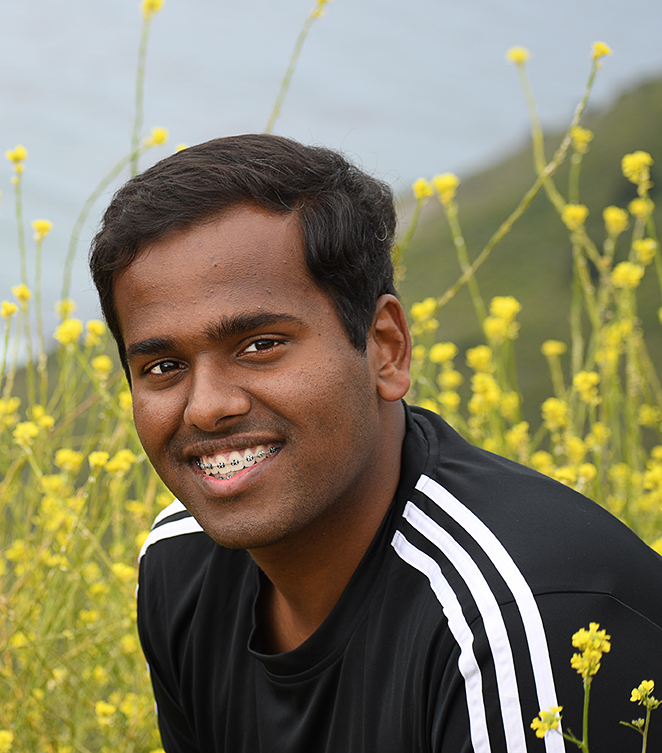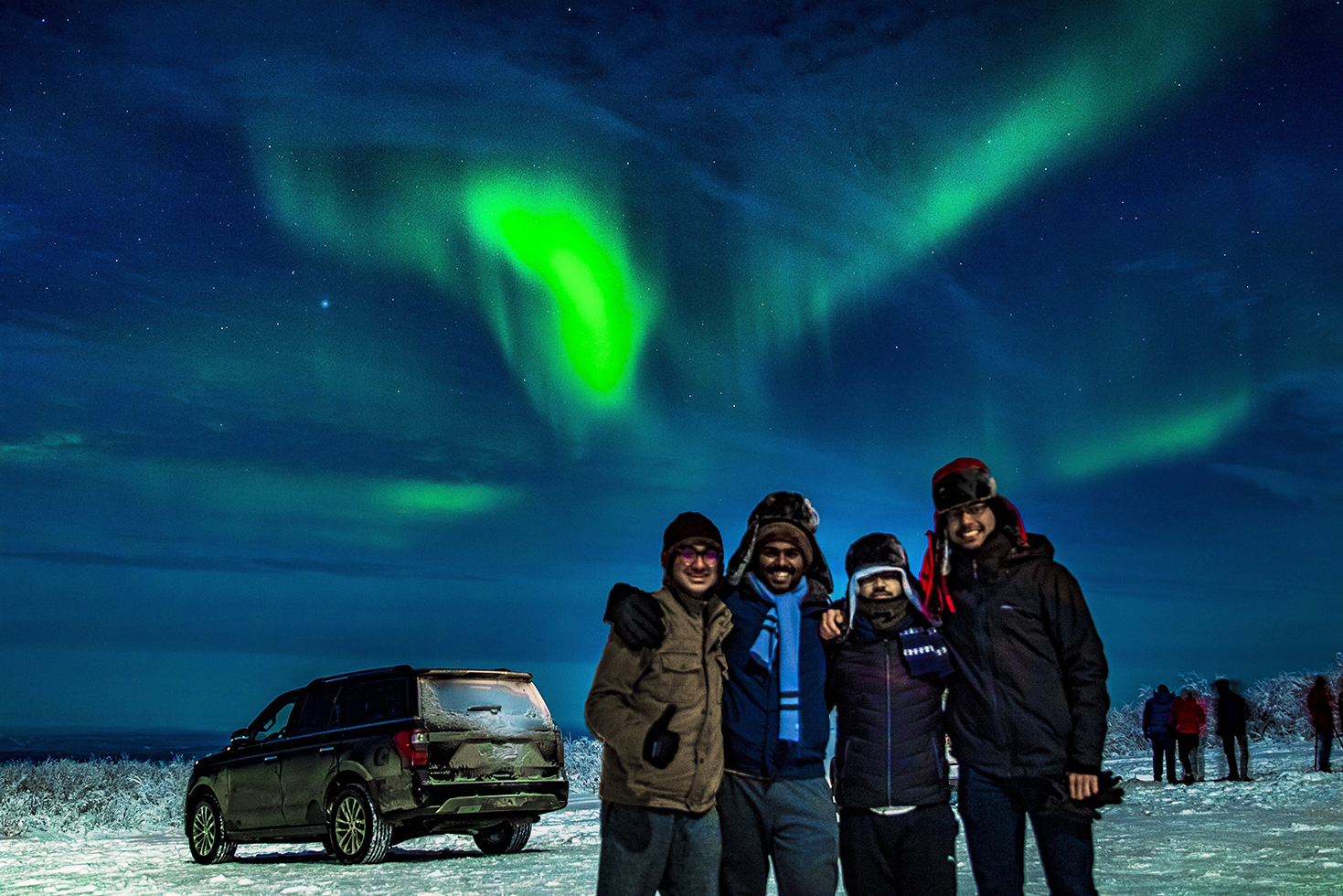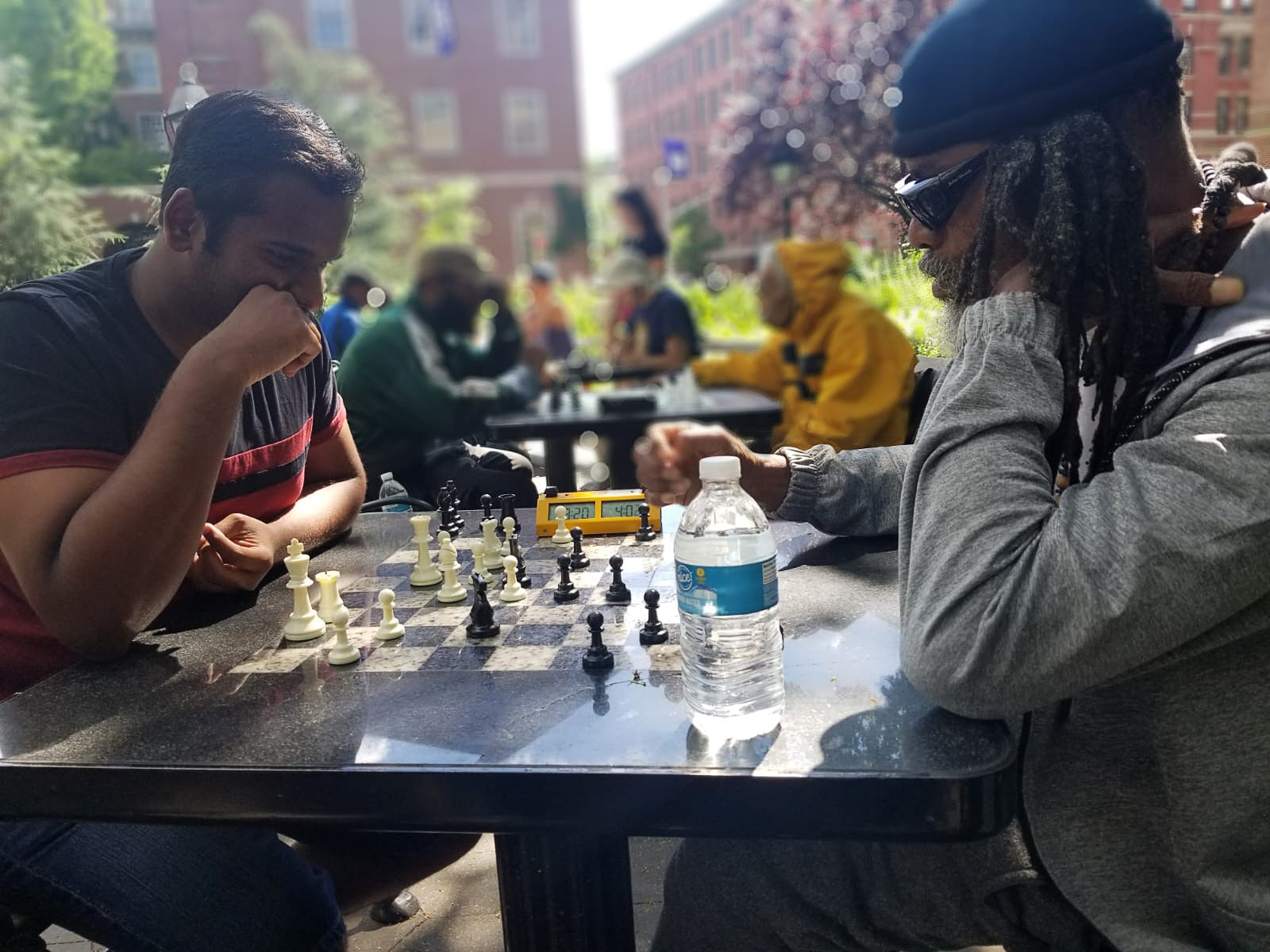INTRODUCTION

Name: Shara Rhagha Wardhan Balakrishnan
Advisor: Enoch Yeung
Hometown: Coimbatore, Tamil Nadu, India
Previous degrees: Dual degree(B.Tech. + M.Tech.) in Mechanical Engineering with specialization in Intelligent manufacturing
- Indian Institute of Technology(IIT) Madras, 2016, M.S. in Electrical and Computer Engineering
- UCSB, 2018
Degree sought from UCSB: PhD in Electrical and Computer Engineering
Degree progress: 2nd year
UCSB Student organizations: President of Indian Association of Santa Barbara(IASB) 2018-2019
Hobbies, activities and interests
I always try to make time for either running, yoga, swimming, tennis or badminton. I love playing board games and my usuals
are chess (played competitively in middle school), settlers of Catan and ticket to ride Europe.
Other interests are fencing, social dancing and cooking (though my only specialty is the South Indian cuisine).
RESEARCH
Research Program: CCSP/ Controls
Main area of research: System identification and control in synthetic biology
Research interests: System identification, Koopman operator theory, Synthetic biology, Metabolic pathway engineering
Title of your most important publication to date
I just had my first conference paper acceptance for ACC 2020 titled "Prediction of fitness in bacteria with causal jump dynamic mode decomposition"
Please describe your research in more detail
Synthetic biological circuits have the potential to harness the growth of individual cells. Is it possible to influence the population dynamics of a consortia of microbes using tools from synthetic biology? The aim is to identify a set of genes responsible for growth that can be observed and controlled. This is achieved using the generic approach of building a state space model and performing the observability and controllability analysis. Since the system is nonlinear, we use Koopman operator theory to identify a linear state space model using the RNA sequencing data and the growth dynamics data of the microbe. We perform observability and controllability analysis on this model to identify the genes or interest. Then, we could build actuators for the set of genes using CRISPRi technology that enable control of the growth rate of the microbe.
Some potential applications of the growth harness work are to build rapidly growing microorganisms for industrial microbiology and perform secure bio-design.
What made you interested in your area of research and how did you get in to it?
I developed an interest in control engineering during my 2nd year of undergrad and I liked its abstract nature that it allows me to work on many applications. I talked to Prof. Enoch Yeung and he gave me a shot to try the field of synthetic biology for a quarter. It felt like I was venturing into the unknown and to tackle this new field with the tools (like control theory, system identification, optimization,...) that I had acquired felt like an "everything led to this point" moment. .
What motivates you in your research?
Synthetic biology has made significant progress in the areas of developing biofuels, biomedicine, biomaterials,... But, this is a budding field and with the advent of the covid-19 pandemic, it can be seen that there is so much more to be done. With my experience in data analysis and control systems and a starter pack knowledge of biology, I ask myself what is it that I can do to advance this field of research and the thought that I could solve a real world problem drives me.
How has your research and UCSB changed you?
During the course of my PhD, I have started to think outside the box, come up with new original ideas and get those ideas to completion in a useful form. The UCSB environment helped me work on my team work skills, create a work-life balance and build knowledge from various courses.
UCSB prides itself on its collaborative atmosphere. How do you collaborate with e.g., your advisor, and other faculty, groups, research areas, departments, students (in and outside your group)?
Most of my collaborations have been within my group and I personally feel that actively discussing with colleagues and presenting my work will help me to output good quality work, develop new ideas and progress faster.
LIFE AS A GRAD STUDENT
What is your experience living in Santa Barbara?
It has been a pleasant experience with a variety of food, hikes and beaches close by.
What are your personal Career Goals? Where do you want to be in 10 years?
Still undecided but have equal inclinations towards industry and academia
Are you or have you been a TA or GSR?: Yes
If so, what classes/labs do/did you teach: Analog Electronics (Physics 127AL) in
Spring 2017 and Fall 2017
What made you select UCSB and the Electrical Engineering program?
Through my master's program I explored various interests and eventually I narrowed
down to one and applied for PhD
What are your experiences with the program so far?
This program is slowly helping me become a good researcher, a fine collaborator and
a better communicator
What are some of the department and the program's strengths?
The faculty are really good in what they specialize in and are open to adapting to student's
requirements. There is a good amount of diversity among the research topics of the various faculties.
How would you explain campus life as an engineering student?
While doing courses, it was hectic to do courses and TA outside the department. Currently, in research, it is
relatively relaxed and I can create time to do some physical activity as well to keep a good work-life balance.
What challenges have you faced as a student or researcher?
Getting a TA in the ECE department was difficult while doing Master's. Changing from MEMS to synthetic biology one year into my PhD.
What would you say to others who are considering becoming a student or researcher at UCSB?
In addition to the area of research, please do consider the compatibility with the advisor as well as the people in the lab Collaboration and communication goes a long way in minimizing stress levels and making PhD a rather fun experience
PERSONAL
What is your living situation like? (Roommates, living at home, apartment, student housing etc.)
I live in a house at Turnpike and Hollister near the In-N-Out Burger with a couple housemates who also pursue PhD at UCSB.
5 words your family and friends would use to describe you?
Persistent, tactical, supportive, extrovert and team player
What are your biggest strengths?
- Analytical ability
- Considerate
- Joyful and friendly
Favorite classe(s) you have ever taken? Why did you like it/them so much?
While in IIT Madras, I liked doing "Applied time series analysis" and "System identification" by Prof. Arun K Tangirala. Given some data about a system, it always forces me to ask the most fundamental question of what is my application and then backtrack to the question of what is the corresponding model I should build and then figure out how to go about it.
In UCSB, I enjoyed doing "Network systems theory" by Prof. Francesco Bullo and "Optimal control" course by Prof. Jason R Marden. Though I haven't used it in practice yet, Prof. Bullo's course gave me a new direction to think about problems and I think it will become a very essential tool when I start addressing problems about consortium of microbes. In Prof. Marden's course, I really liked the style of teaching that before jumping into a control problem, ask the first basic question of how to characterize the state of the system. It seemed trivial back then but when I started doing research in biological systems, the question was not as straight forward. I also enjoyed building my first AI model to play a miniaturized backgammon game.
What are your plans for the near future? (travel, research, internship etc)
With the quarantine due to covid-19, I hope to use this as a breather room to acquire knowledge
in synthetic biology and mathematical concepts like differential geometry, real analysis,... and also
get my first journal paper out.
What is on your bucket list this year?
Visit at least two national parks outside California, surf my first wave while standing up, learn to
play the violin and possibly not get infected by covid-19. I feel optimistic that I can do 50% of the stuff.
What did you want to be when you were younger?
I thought I was destined to become a grandmaster in chess. I guess I owe an apology to the younger me.
What is something you can't go a day without doing?
A sitcom episode and chilling with friends and family
What accomplishment are you most proud of?
While in undergrad, I was a shy extrovert which is not a good combination to have when meeting new
people and making connections. I joined Toastmasters International which is a public speaking club
and within a year I became a better communicator with minimal stage fright. Further, I went on to become
the President of the club and during my tenure, I was able to double the membership of the club and
personally mentor 7 people to become better communicators.
What are some people you have looked up to in your life? How have they inspired or impacted you?
Two people who really motivated me to shape my thoughts in the right direction are my undergrad advisor
Prof. Arun K Tangirala and my current PhD advisor Prof. Enoch Yeung.
Prof. Tangirala's approach to teaching his courses was to give a strong foundation in the fundamentals and then frame assignments and exams in way to push your thought process to the extreme. It felt intimidating as well as enriching at the same time. I ended up learning a whole lot and went on to do my thesis project with him. During the time we worked together, he dedicated a lot of time to ensure that I got a flavor for research, figure out my style of work and plant the seed to pursue a PhD.
My current PhD advisor Prof. Enoch Yeung is another key figure in my life. He has a strong foothold in control theory as well as biology and actively pursues research in both domains in a fashion that they reinforce each other. This inspired me to join his group as it is my belief that I work most efficiently and do my best work in interdisciplinary research. On a personal front, I used to be a person driven by deadlines which resulted in a lot of mental stress. He works with the philosophy that one can output their best work when one is calm and composed. So, he strives hard to remove all external burdens of students, create a collaborative lab environment and work with the students actively. With me personally, he works actively to ensure that I get driven by passion for science and enjoy the journey of solving the problem rather than my former approach of being driven by deadlines. As a result, my research has been quite satisfactory and has enabled me to maintain a healthy work-life balance. It is after joining his group that I feel I am on the path to become the kind of researcher that can make a tangible impact on society.
Playing chess competitively is one of the things that has deeply shaped me. It took a while to get there, but by repeatedly facing failure despite putting in a lot of effort, I became accustomed to defeat. It is at that point that I started developing an attitude to pick myself back up and keep giving everything I got despite numerous failures.

